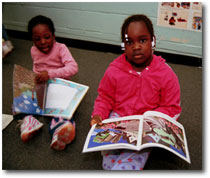 |
The Learning Ladder
|
| Module 6: Curriculum Planning | ||||
| Part 1 | Part 2 | Part 3 | Part 4 | Part 5 |
Welcome to the Introduction to Module 6!

Module Objectives
It takes a lot of thinking and creativity to plan for the needs of all of the children in our classrooms. We know that in order to create a good curriculum for preschool-aged children, it must be developmentally appropriate. This means that first we must consider the developmental stages of the children we are teaching. We can then organize our classrooms, the materials and equipment we use, and the activities we do in ways that will meet the needs of each child.
In this module you will learn ...
- to set up your room so that it is a place where learning occurs.
- the parts that make up a curriculum for young children.
- the kinds of activities that go into a daily schedule.
- about materials that give opportunities for learning.
In this module you will ...
- create a design for interest areas in a classroom.
- work with a daily schedule.
- know classroom materials that support children's learning.
Terms from the Field
Below are words and definitions that you may need when you work as an early care and education teacher. You will learn more about these words later in the module.
When you see the speaker
![]() after each of the definitions you can hear the pronunciation of the term
and what it means.
after each of the definitions you can hear the pronunciation of the term
and what it means.
curriculum - everything that teachers do with children to help them develop and learn.
|
curriculum [WAV] (121kb WAV file) curriculum [RAM] (15kb RAM file) |
developmentally appropriate - when we organize the classroom space, materials, and the activities we use to meet the developmental needs of the children in our classrooms.
|
developmentally appropriate [WAV] (248kb WAV file) developmentally appropriate [RAM] (27kb RAM file) |
schedule - a daily routine of activities happening at a planned time of the day. A preschool schedule should include a mix of quiet times and noisy times, of teacher-directed activities, child-directed activities, and of large and small group activities.
|
schedule [WAV] (355kb WAV file) schedule [RAM] (41kb RAM file) |
competent - when a child practices a skill until he/she has mastered it and feels confident in his/her ability to do it.
|
competent [WAV] (194kb WAV file) competent [RAM] (21kb RAM file) |
independently - the ability of a child to do things by his or herself without adult help.
|
independently [WAV] (139kb WAV file) independently [RAM] (17kb RAM file) |
self-esteem - Self-esteem is when a child has good feelings about him or herself and the things he or she is able to do.
self-help skills - skills that include a child's ability to take care of his/her own needs. Examples of these skills are putting on clothing and washing hands and face without help.
|
self-help skills [WAV] (245kb WAV file) self-help skills [RAM] (25kb RAM file) |
open-ended questions - asking questions that do not look for a correct or incorrect answer and need more than a one word response. For example: "Is that a painting of your house?" is a closed question that a child can answer with a yes or a no. Instead, ask the question in an open-ended way such as, "Can you tell me about your painting?"
|
open-ended questions [WAV] (452kb WAV file) open-ended questions [RAM] (50kb RAM file) |
laminating machine - a tool that protects children's art, photographs, posters, and other paper by covering them in clear plastic.
|
laminating machine [WAV] (194kb WAV file) laminating machine [RAM] (21kb RAM file) |
If you find other words that you don't understand, you can do two things :
1. Learn how to identify a word without a dictionary.
Or
2. Use an online dictionary that will be at the bottom of each page. See below.
| Now go to the activities for Part 1. | |
